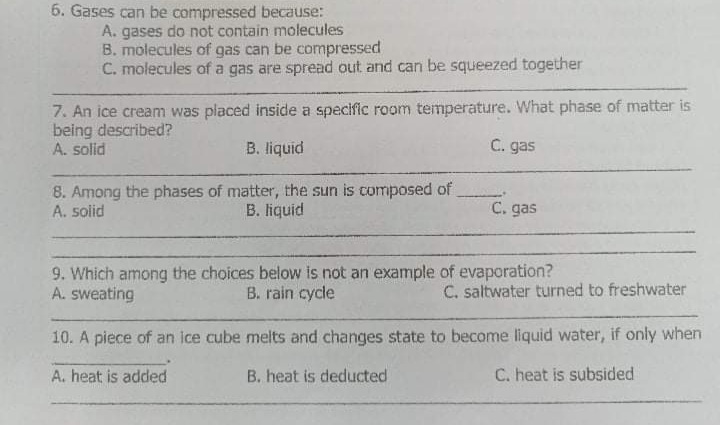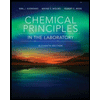6. Gases can be compressed because: A. gases do not contain molecules B. molecules of gas can be compressed C. molecules of a gas are spread out and can be squeezed together 7. An ice cream was placed inside a specific room temperature. What phase of matter is being described? A. solid B. liquid C. gas 8. Among the phases of matter, the sun is composed of A. solid B. liquid C. gas 9. Which among the choices below is not an example of evaporation? A. sweating B. rain cycle C. saltwater turned to freshwater 10. A piece of an ice cube melts and changes state to become liquid water, if only when A. heat is added B. heat is deducted C. heat is subsided
6. Gases can be compressed because: A. gases do not contain molecules B. molecules of gas can be compressed C. molecules of a gas are spread out and can be squeezed together 7. An ice cream was placed inside a specific room temperature. What phase of matter is being described? A. solid B. liquid C. gas 8. Among the phases of matter, the sun is composed of A. solid B. liquid C. gas 9. Which among the choices below is not an example of evaporation? A. sweating B. rain cycle C. saltwater turned to freshwater 10. A piece of an ice cube melts and changes state to become liquid water, if only when A. heat is added B. heat is deducted C. heat is subsided
Introductory Chemistry: A Foundation
9th Edition
ISBN:9781337399425
Author:Steven S. Zumdahl, Donald J. DeCoste
Publisher:Steven S. Zumdahl, Donald J. DeCoste
Chapter15: Solutions
Section: Chapter Questions
Problem 14CR
Related questions
Question
ENCIRCLE THE CORRECT ANSWER AND JUSTIFY IT IN A BRIEF EXPLANATION. WRITE YOUR EXPLANATION ON THE SPACE PROVIDED

Transcribed Image Text:6. Gases can be compressed because:
A. gases do not contain molecules
B. molecules of gas can be compressed
C. molecules of a gas are spread out and can be squeezed together
7. An ice cream was placed inside a specific room temperature. What phase of matter is
being described?
A. solid
B. liquid
C. gas
8. Among the phases of matter, the sun is composed of
A. solid
C. gas
B. liquid
9. Which among the choices below is not an example of evaporation?
A. sweating
B. rain cycle
C. saltwater turned to freshwater
10. A piece of an ice cube melts and changes state to become liquid water, if only when
A. heat is added
B. heat is deducted
C. heat is subsided
Expert Solution
This question has been solved!
Explore an expertly crafted, step-by-step solution for a thorough understanding of key concepts.
Step by step
Solved in 2 steps

Recommended textbooks for you

Introductory Chemistry: A Foundation
Chemistry
ISBN:
9781337399425
Author:
Steven S. Zumdahl, Donald J. DeCoste
Publisher:
Cengage Learning

Chemical Principles in the Laboratory
Chemistry
ISBN:
9781305264434
Author:
Emil Slowinski, Wayne C. Wolsey, Robert Rossi
Publisher:
Brooks Cole

World of Chemistry, 3rd edition
Chemistry
ISBN:
9781133109655
Author:
Steven S. Zumdahl, Susan L. Zumdahl, Donald J. DeCoste
Publisher:
Brooks / Cole / Cengage Learning

Introductory Chemistry: A Foundation
Chemistry
ISBN:
9781337399425
Author:
Steven S. Zumdahl, Donald J. DeCoste
Publisher:
Cengage Learning

Chemical Principles in the Laboratory
Chemistry
ISBN:
9781305264434
Author:
Emil Slowinski, Wayne C. Wolsey, Robert Rossi
Publisher:
Brooks Cole

World of Chemistry, 3rd edition
Chemistry
ISBN:
9781133109655
Author:
Steven S. Zumdahl, Susan L. Zumdahl, Donald J. DeCoste
Publisher:
Brooks / Cole / Cengage Learning

Chemistry: Principles and Reactions
Chemistry
ISBN:
9781305079373
Author:
William L. Masterton, Cecile N. Hurley
Publisher:
Cengage Learning


Introductory Chemistry: An Active Learning Approa…
Chemistry
ISBN:
9781305079250
Author:
Mark S. Cracolice, Ed Peters
Publisher:
Cengage Learning